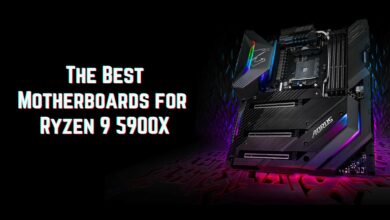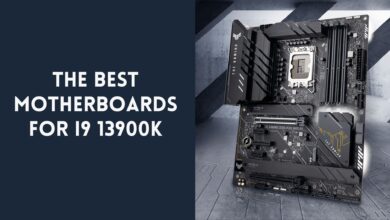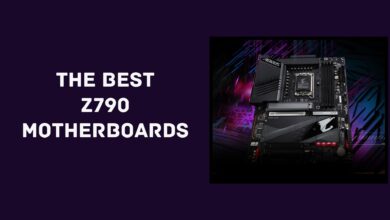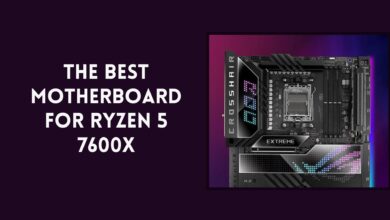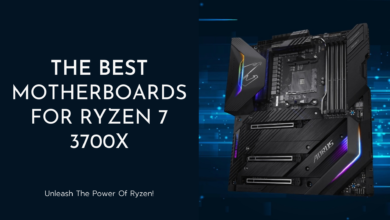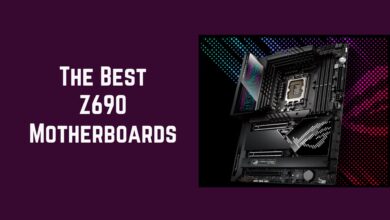The 5 Best Performing Z590 Motherboards For Intel Processors
Jumping to your favorite or Best Z590 Motherboard would be a quick thing to do – but first, let’s take a look at the background of Z590. On 11th January 2021, Intel took advantage of the CES 2021 Platform to introduce their brand new chipset known as Z590. This new chipset is a successor to the Z490 Motherboards that were released with the Intel 10th Gen Comet Lake processors.
The older Z490 chipset will still support the upcoming 11th Gen Rocket Lake processors, however, Intel does recommend the Z590 chipset motherboards for maximum optimization. The 11th Gen processors are built on a slightly different architecture than the typical Skylake refresh that we are seeing for quite some time now. This makes Z590 an option to consider for those who are looking to buy a brand new Intel 11th Gen CPU but do not have any existing motherboard. Although 2021 and 2022 have been hit with an incredible shortage of CPUs and GPUs, motherboards have not been hit as hard as the aforementioned components. However, new system builders will have to move quickly because the 11th Gen CPU stock might not last long after release.
Our Top Picks For the Best Z590 Motherboard
| # | Preview | Product Name | Description | Availability |
|---|---|---|---|---|
| 1 | 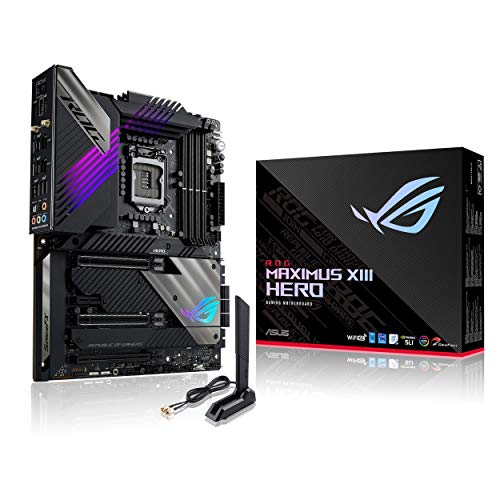 | ASUS ROG Maximus XIII Hero (WiFi 6E) | Best Overall Z590 Motherboard | Check Price |
| 2 | 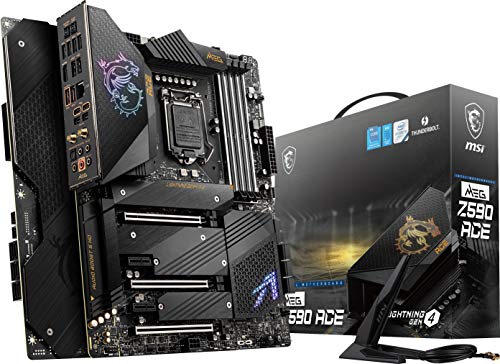 | MSI MEG Z590 ACE | Best Feature Rich Z590 Motherboard | Check Price |
| 3 | 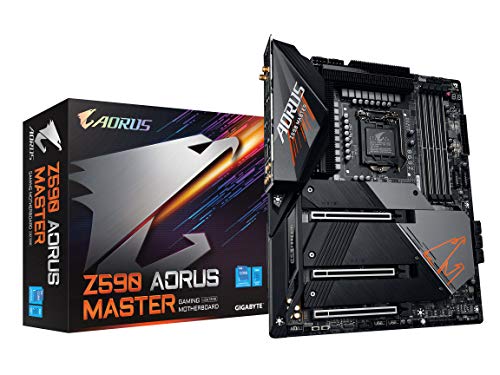 | Gigabyte AORUS Master Z590 | Best Overclocking Z590 Motherboard | Check Price |
| 4 | 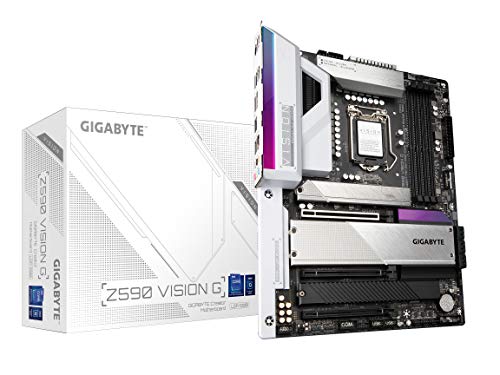 | Gigabyte Z590 Vision G | Best Looking Z590 Motherboard | Check Price |
| 5 | 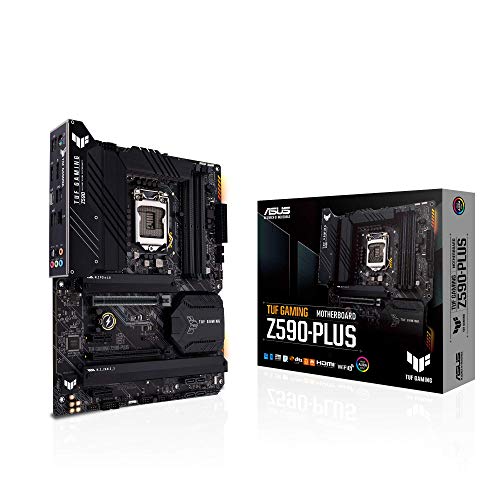 | ASUS TUF Gaming Z590-Plus | Best Value Z590 Motherboard | Check Price |
| # | 1 |
| Preview |  |
| Product Name | ASUS ROG Maximus XIII Hero (WiFi 6E) |
| Description | Best Overall Z590 Motherboard |
| Availability | Check Price |
| # | 2 |
| Preview |  |
| Product Name | MSI MEG Z590 ACE |
| Description | Best Feature Rich Z590 Motherboard |
| Availability | Check Price |
| # | 3 |
| Preview |  |
| Product Name | Gigabyte AORUS Master Z590 |
| Description | Best Overclocking Z590 Motherboard |
| Availability | Check Price |
| # | 4 |
| Preview |  |
| Product Name | Gigabyte Z590 Vision G |
| Description | Best Looking Z590 Motherboard |
| Availability | Check Price |
| # | 5 |
| Preview |  |
| Product Name | ASUS TUF Gaming Z590-Plus |
| Description | Best Value Z590 Motherboard |
| Availability | Check Price |
Last Update on 2024-03-05 at 21:05 / Affiliate links / Images from Amazon Product Advertising API
Since Z590 is such a new chipset with limited exposure as of the time of writing, choosing the a Z590 motherboards for the new Intel 11th Gen Core Processors was not an easy task. VRM quality and power delivery is a critical factor in the purchase decision for these new motherboards, as the 11th Gen processors do have quite a bit of overclocking potential that can only be unlocked with a capable and robust VRM. Keeping that in mind, here are the 5 best Z590 motherboards for Intel’s Rocket Lake 11th Gen processors in 2022.
1. Best Overall Z590 Motherboard - ASUS ROG Maximus XIII Hero (WiFi 6E)
Premium Offering from ASUS
Pros
- Robust VRM
- High Memory Support
- Beautiful Aesthetics
- Lots of Connectivity
- Inclusion of WiFI 6E
- Four M.2 Slots
Cons
- Very High Price
Chipset: Z590 | Memory: 4x DIMM, 128GB, DDR4-5333 | Expansion Slots: 2 x PCIe 4.0/3.0 x16 (x16, x8/x8, x8/x4) + 1 x PCIe 3.0 x16 (max. x4) | Video Outputs: 2x HDMI 2.0 and 2x Thunderbolt 4 | USB Ports: 10x rear IO, 9x internal | Network: 2x 2.5GbE Ethernet, 1x Wi-Fi 6E | Storage: 4x M.2, 6x SATA
The ASUS ROG Maximus series is the flagship series of motherboards from ASUS for Intel. The Maximus series has had some legendary motherboards over the years, and it is known for its premium offerings and extensive reliability. The same is the case with the ASUS ROG Maximus XIII Hero, which is the more “reasonable” offering from the Maximus lineup.
Other Intel Motherboard Guides: Best Motherboards for i7 8700K
In typical ASUS fashion, the Maximus XIII Hero packs some really high-end components in a well-rounded package. The VRM design of the Maximus XIII Hero is deemed to be one of the best in the whole Z590 market, and that should really help deliver clean power reliably to overclocked 11th Gen CPUs. This board will be particularly excellent at overclocking the upcoming Core i9 11900K, which is supposed to have a boost frequency of up to 5.3 GHz.
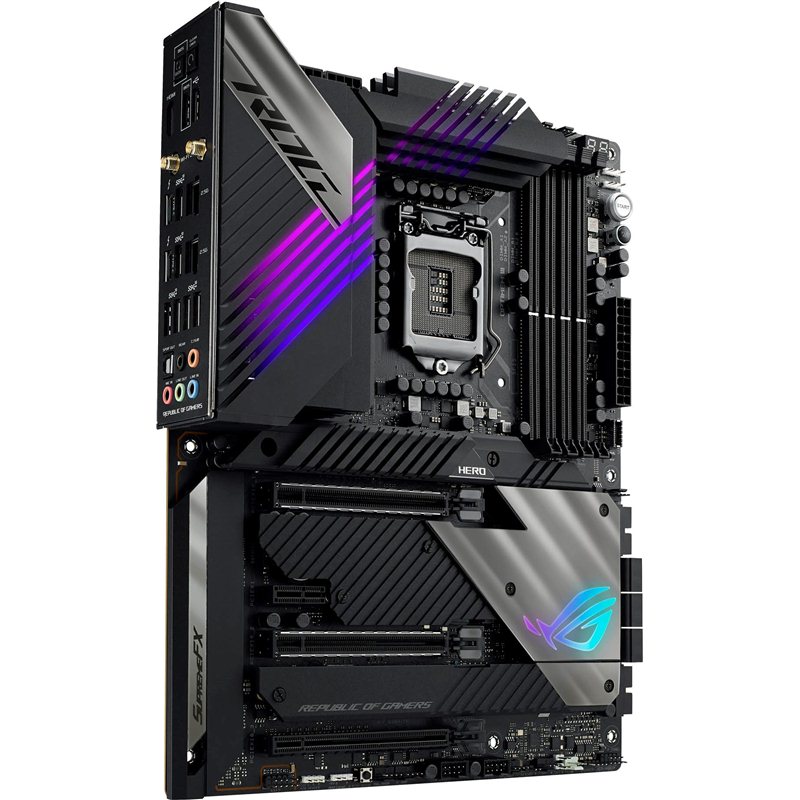
Apart from the VRM, the ASUS ROG Maximus XII Hero is jam-packed with features. It incorporates WiFi 6E, and pairs that with two 2.5GbE Ethernet ports. The board also features 4 M.2 slots, which is quite a lot for any normal PC builder. Of course, the Z590 chipset brings PCIe Gen 4, which will be available on two of those 4 M.2 slots. The board also features Thunderbolt 4, with two rear-facing ports for a host of different applications. The Maximus XIII Hero is also rife with USB options, with 10 USB ports on the rear and 9 more available through internal headers.
Aesthetically, the Maximus XIII Hero is a fantastic-looking board. It features an aggressive design with a majority of the PCB being covered by a black shroud. This limits the exposure of the PCB so that the board appears cleaner when there are components installed on it. The RGB Controlled implementation is also really clean and the board looks great with the two huge lighting zones lit up and synchronized with the rest of the components of the build. The diagonal lighting across the VRM heatsink and I/O cover looks particularly attractive when the board is installed inside a case. ASUS ROG series always puts aesthetics towards the top in their priority list and that shows with the ROG Maximus XIII Hero.
All in all, the ROG Maximus XIII Hero packs every feature in the book and couples them with a really strong power delivery system. It may come as no surprise to enthusiasts that this comes at a hefty price, as the Maximus XIII Hero is one of the most expensive boards on the market so it’s definitely not for everyone.
2. Best Feature Rich Z590 Motherboard - MSI MEG Z590 ACE
Robust but Expensive
Pros
- Strong Power Delivery
- Robust Memory Support
- Four M.2 Drive Slots
- Great Connectivity Options
- Impressive RGB Implementation
Cons
- Incredibly Expensive
- Very Gamer-centric Design
Chipset: Z590 | Memory: 4x DIMM, 128GB, DDR4-5600 | Expansion Slots: 1x PCIe x16, 1x PCIe x16 (x8), 1x PCIe x16 (x4), 2x PCIe x1 | Video Outputs: 1x HDMI 2.0 and 2x Thunderbolt 4 | USB Ports: 8x rear IO, 7x internal | Network: 1x 2.5GbE Ethernet, 1x Wi-Fi 6E | Storage: 4x M.2, 6x SATA
MSI’s premium MEG series is a lineup that is focused on enthusiasts and is thus named MSI Extreme Gaming. One of the finest products in that lineup is the MSI MEG Z590 ACE motherboard which is a high-end Z590 offering from MSI. It aims to fill the gap between the midrange MSI Performance Gaming motherboards and the really high-end Godlike series motherboards.
The MEG Z590 ACE features an incredibly robust power delivery system that is capable of handling any 10th Gen or 11th Gen Intel CPU with strong overclocks. An overclocked 11900K should be no problem for the VRM setup of the MEG Z590 ACE. MSI has also included hefty VRM heatsinks with the ACE so the thermal performance of the motherboard is also really good. The VRM design is one of the strongest points of this motherboard.
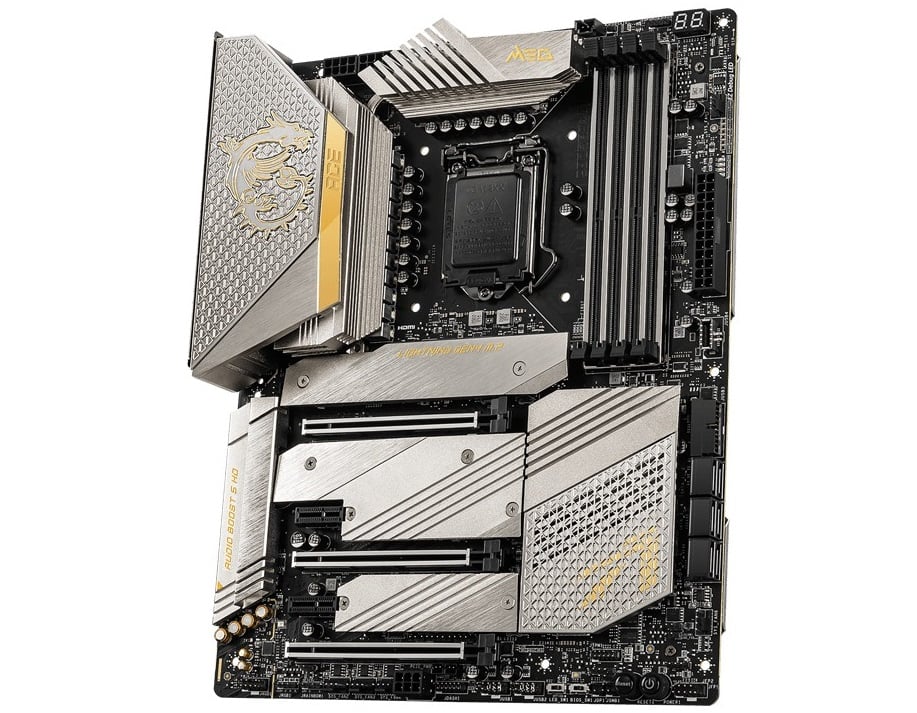
The MEG Z590 ACE does not skimp on any features either. The board offers the options of Wi-Fi 6E as well as a 2.5GbE Ethernet port for connectivity. In terms of storage, the ACE offers 4 M.2 slots and 6 SATA ports, which is the same configuration as the Maximus XIII Hero from ASUS. Thunderbolt 4 is also included in the Z590 ACE, with two USB-C ports on the rear I/O that support this technology. The USB configuration includes 8 rear ports and 7 ports available through the internal headers.
In terms of looks, the Z590 ACE is not exactly the most beautiful board in the world but it is certainly not unattractive. It uses the same approach of PCB covers as the Maximus XIII, with two similar zones of lighting. One can easily figure out that MSI’s design goal was to make the Z590 ACE a bit more dramatic and aggressive than other motherboards in the same category. This is why they have included a full RGB MSI dragon logo on the I/O cover, with a smaller RGB zone on the chipset as well. These RGB areas look really good when they are lit up in a completed system and can be controlled using Mystic Light.
Overall, the MSI MEG Z590 ACE is a really premium motherboard with no obvious missing features. However, its price is a serious concern as it is even more expensive than the Maximus XIII Hero while offering no real advantage to the ASUS offering, which further gives fuel to the MSI vs ASUS debate. Potential buyers might be better off getting the ASUS Maximus XIII Hero if they want a better price-to-features ratio.
3. Best Overclocking Z590 Motherboard - Gigabyte AORUS Master Z590
A Well-Rounded High-End Option
Pros
- Solid Power Delivery
- Incredible Connectivity
- 10GbE Ethernet
- WiFi 6E Support
Cons
- Lack of Thunderbolt 4
- High Price
- Fewer M.2 Slots Than Competitors
Chipset: Z590 | Memory: 4x DIMM, 128GB, DDR4-5400 | Expansion Slots: 1x PCIe x16, 1x PCIe x16 (x8), 1x PCIe x16 (x4) | Video Outputs: 1x Displayport 1.2 | USB Ports: 10x rear IO, 9x internal | Network: 1x 10GbE Ethernet, 1x Wi-Fi 6E | Storage: 3x M.2, 6x SATA
The Z590 AORUS Master from Gigabyte is another motherboard that falls in the reasonably high-end category. It might not be as ridiculously overkill as its AORUS Extreme bigger brother, but it still packs almost all the features that one might reasonably expect from a high-end board, albeit at a much lower price point. It is even a bit more competitive than the ASUS ROG Strix Maximus XIII Hero, although it’s not a cheap board by any means.
More Intel Motherboards Guide: Best Motherboards For i9 9900k
Under the huge VRM heatsinks, the AORUS Master packs quite a solid power delivery system that is enough to feed even the most demanding Intel chips on the market. The robust VRM design ensures that the board provides clean and stable power to the CPU when it demands it, to improve the stability of the overclocks and the boost behavior of the CPU under stock conditions. The VRM is cooled by a large finned heatsink that ensures that the temperatures are kept in check.

The AORUS Master is also quite a feature-packed board, with some features that are not even available on more expensive variants. One of the said features is the inclusion of a 10GbE Ethernet port in conjunction with Wi-Fi 6E for connectivity. This makes the connectivity setup of the AORUS Master Z590 even more versatile than the ones on the ASUS Maximus XIII Hero and the MSI MEG Z590 ACE. The AORUS Master does lack any Thunderbolt 3 ports, however, and that is a bit of a downside at this price point. It does, however, feature 3 M.2 Slots and 6 SATA ports for your storage needs.
In terms of aesthetics, there is really nothing special about the AORUS Z590. It features an industrial design leaning towards colour-neutral tones, with a splash of Gigabyte orange here and there. The PCB is covered mostly with plastic covers to provide a cleaner overall look. The RGB zones are confined to the chipset AORUS logo and some design elements on the I/O cover. All in all, the aesthetics of the AORUS Master are not the reason you might want to consider this motherboard.
The AORUS Master is a nice alternative to the Maximus XIII Hero at a slightly cheaper price, although it does lack any Thunderbolt connectivity whatsoever. Whether or not that impacts their decision significantly, is up to the potential buyer.
Other Intel Motherboards: Best X299 Motherboards
4. Best Looking Z590 Motherboard - Gigabyte Z590 Vision G
Great Aesthetics
Pros
- Aesthetically Beautiful
- Solid VRM Design
- Good Connectivity
- Has Four M.2 Slots
Cons
- Lack of Thunderbolt 4
- No Wi-Fi
- Expensive
Chipset: Z590 | Memory: 4x DIMM, 128GB, DDR4-5333 | Expansion Slots: 1x PCIe x16, 1x PCIe x16 (x8), 1x PCIe x16 (x4) | Video Outputs: 1x HDMI 1.4 and 1x Displayport 1.2 | USB Ports: 10x rear IO, 7x internal | Network: 1x 2.5GbE Ethernet | Storage: 4x M.2, 6x SATA
Gigabyte’s Vision lineup is a line of aesthetically beautiful motherboards as well as graphics cards that offer a minimalistic design with beautifully implemented RGB lighting for those of us who prioritize aesthetics over everything else. The Z590 Vision G is an excellent motherboard from the Vision lineup that combines exceptional aesthetics with a decent feature set.
In terms of power delivery, the Gigabyte Vision G is no slouch either. Its VRM setup closely resembles that on the Z590 AORUS Master, although it is toned down a little bit due to the price category of the Vision G. This means that this motherboard should be able to handle any current Intel chip at overclocked settings relatively comfortably, provided that you do not intend to break any overclocking records with it.
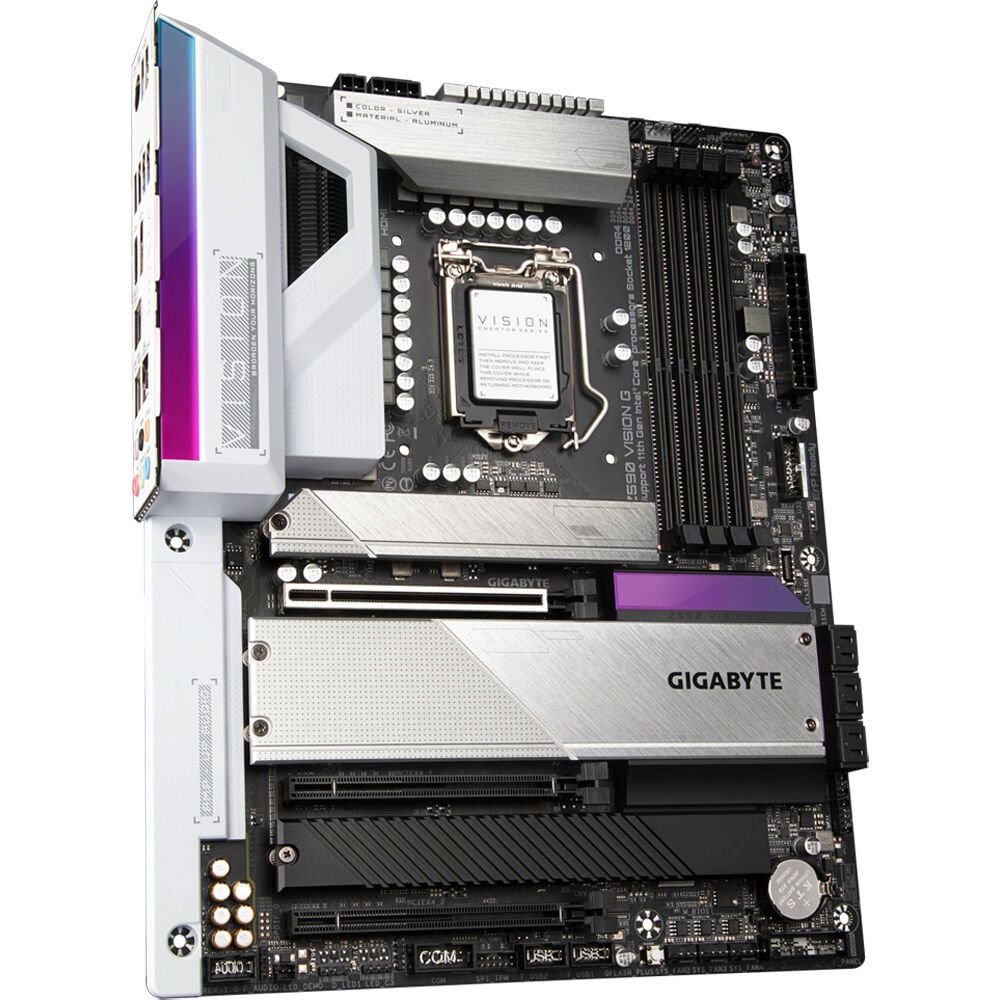
The Vision G is also reasonably well-equipped in the features department. It has 4 M.2 slots and 6 SATA ports for storage, with two of those M.2 slots supporting PCIe Gen 4 connectivity. The networking on the board is handled by a 2.5GbE Ethernet port, although the board lacks any kind of Wi-Fi connectivity which might be an annoyance to some users, but can be easily rectified by a cheap PCIe WiFi card. The Vision G is also equipped with 10 rear USB ports and 7 ports accessible through the internal headers.
The aesthetics category is where the Vision G really shines. It is one of the most beautiful Z590 motherboards on the market. It features a white-on-black design with a minimalistic design language that would pair excellently with some white minimalistic cases such as from NZXT and Corsair. Two zones of RGB are present on the board, with the larger one occupying the top left corner of the I/O cover. The aesthetics of this board are its definite selling point.
All in all, the Vision G Z590 is a solid motherboard in terms of power delivery and features, but it is the design of the board that really elevates it to the next level. There are a couple of features missing from the board that would have made it an even better value for the money, but overall it’s simply a great Z590 motherboard.
5. Best Value Z590 Motherboard- ASUS TUF Gaming Z590-Plus
A Budget Alternative
Pros
- Relatively Affordable
- Good Power Delivery
- Well-Rounded Feature Set
Cons
- No Wi-Fi
- Plain Aesthetics
- Lack of Thunderbolt 4
- Few USB Ports
Chipset: Z590 | Memory: 4x DIMM, 128GB, DDR4-5133 | Expansion Slots: 1 x PCIe 4.0/3.0 x16 slot, 1 x PCIe 3.0 x16 slot, 2 x PCIe 3.0 x1 slots | Video Outputs: 1x HDMI 2.0 and 1x Displayport 1.4 | USB Ports: 7x rear IO, 7x internal | Network: 2x 2.5GbE Ethernet | Storage: 3x M.2, 6x SATA
The TUF Gaming lineup from ASUS is one of the more relatively affordable motherboard lineups on the market. ASUS usually strips off some of the bells and whistles from the Strix boards, while keeping the good power delivery and a solid feature set to create the TUF variants of those boards. This means that the TUF Gaming Z590-Plus is an excellent motherboard for the price, even if it lacks some features.
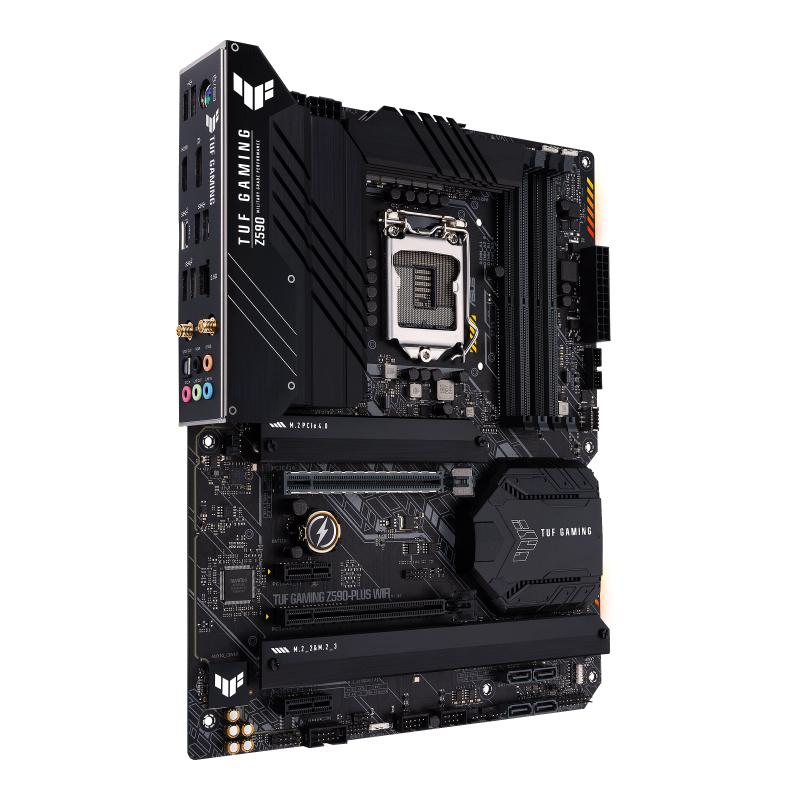
The TUF Gaming Z590-Plus offers a decent power delivery system that might not be as good as the one on the Maximus XIII Hero, but it should be enough to handle most of the upcoming Intel 11th Gen CPUs even at overclocked settings. The feature set of the TUF Gaming is not bad either, with 3x M.2 slots and 6 SATA ports for storage. Of course, like the more expensive boards, the ASUS TUF Gaming Z590-Plus also supports full PCIe Gen 4, however, you might want to read this article to judge if you should upgrade to PCIe Gen 4. There is no WiFi, however, the board does have 2x 2.5 GbE Ethernet ports. Furthermore, ASUS has included 7 rear USB ports coupled with 7 more available through the internal headers.
The ASUS TUF Gaming Z590-Plus is unremarkable in the department of aesthetics. Most of the PCB is covered by black covers with little-to-no RGB lighting visible anywhere. The board will be a good fit for blackout builds, although it might not be the board to buy for lighting enthusiasts. The board also lacks any Thunderbolt 4 connectivity, but that is something that can be forgiven at this price point.
Overall, the ASUS TUF Gaming Z590-Plus is an excellent motherboard for the price. It is quite a bit cheaper than the other boards mentioned in the list and still delivers on multiple grounds including power delivery and features. It might be lacking Wi-Fi and Thunderbolt but that can be excused given the price. This is definitely the board to consider if you need a well-performing Z590 motherboard without any extra bells and whistles.
Best Z590 Motherboards - FAQs
Overall, one can safely say that the Z590 chipset is a better chipset choice than the Z490 chipset. Z590 is more future-proof and has some newer technological features here and there such as the DMIx8 chipset link as opposed to the DMIx4 chipset link of Z490. As for if you should upgrade from Z490 to Z590, it is a different story. Generally, it does not make sense for one to upgrade from a Z490 motherboard to a Z590 one, because the small improvements do not merit the upgrade on their own. We already have the Best Z490 Motherboard Guide.
Yes, the Z590 chipset officially supports both 10th Gen and 11th Gen Core processors. Intel made it clear that the Z590 motherboards are not essential for any existing 10th Gen user, however, they will offer a bit of an improvement over the slightly older Z490 motherboards if one were to pair the 10th Gen CPU with a Z590 board. It is commonly advised that users only buy the Z590 motherboards if they want to pair an 11th Gen CPU with that board and utilize it to its fullest potential.
Yes, the 11th generation of Intel processors, codenamed “Rocket Lake”, do officially support the PCIe Gen 4 standard. Intel is a bit late to the party in this regard, as AMD has had PCIe Gen 4 on their mainstream desktop processors for a while now, but nevertheless, it is a good addition to Intel’s arsenal. PCIe Gen 4 allows the user to install super-fast PCIe Gen 4 compatible NVMe SSDs in the system with huge performance gains over standard Gen 3 drives.
PCIe Gen 4 is a standard that is going to get more and more widespread adoption moving forward and now seems to be the perfect time to jump on the train. The newer PCIe Gen 4 SSDs are the main reason one would want to build a Gen 4 system as of the time of writing, and whether or not you really need that extra speed depends on your particular workload. CPUs and GPUs are currently not seeing significant performance bumps from Gen 4, however, that might change down the line. Overall, PCIe Gen 4 does seem worth it if you’re building a brand new system in 2022 from scratch.
Factors to Consider While Buying Z590 Motherboard
As one might expect, making a purchase decision for a motherboard comes with its fair share of challenges. Especially with a relatively new chipset like Z590, the difficulty level is increased because the potential buyers do not have a reference point to which the boards can be compared in the same generation. However, there are certainly some factors that one should consider while making the buying decision for a motherboard. One of them certainly is how much you should actually spend on a motherboard, but other than that, the following factors should definitely be on your checklist.
Upgrade Path
One of the factors that you should keep in your mind while making a purchase decision has to be the upgrade path that you can expect from your investment. Oftentimes, a motherboard is not the component that is holding back the performance of your particular build, so people tend to use the same motherboard for a long time. In such cases, it is important to plan ahead and choose a platform that would not only unlock the full potential of your current CPU but would also give you a path to upgrade to subsequent generations in the future.
Gimmicks vs Features
In today’s world of marketing jargon and buzzwords, it is no surprise that most of the product pages are nothing more than a collection of random words thrown together to convince the novice buyer to purchase the product in question. In motherboards, these meaningless marketing terms, or “gimmicks”, are plentiful and may range from the inclusion of words like “Gaming motherboard”, “VR Ready”, “Ultra Armor” to completely useless inclusions like IO covers that hamper thermal performance. All of these useless gimmicks should be separated from useful features that the motherboard offers, and the decision should be based on the latter alone.
While these are just some of the factors that one should keep in mind while making a purchase decision for a motherboard, there are certainly several others that hold equal importance in the overall process. You might want to check out our in-depth motherboard buying guide that goes into detail on all those factors, and more. Combining the knowledge from our guides with comprehensive research beforehand about the motherboard you want to buy, will make sure that your final purchase maximizes the value for your money and satisfies your purpose. While you are done with this, go through Z270 Motherboard Guide as well.
 Check Price
Check Price